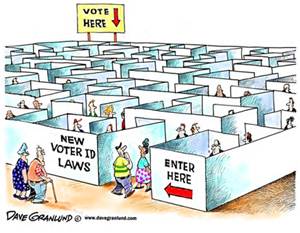North Carolina Senate Race Sows Voter Confusion
Last Minute Voter Suppression Tactic Probably Cost Democrats Senate Election
In the closest US Senate skirmish tallied thus far in the 2014 midterm elections, incumbent Democrat Kay Hagan has apparently lost to Thom Tillis, the Speaker of the North Carolina House of Representatives. According to the latest update from the Associated Press, Hagan has lost by 48,511 votes out of more than 2.8 million votes cast.
Most analysts predicted that Hagan would squeak by this election by two or three percentage points. Perhaps because of the unpopularity of an array of hardcore conservative laws passed by Tillis’s legislature, Hagan was given the upper hand by famed prognosticator Nate Silver on election eve. The Bing search engine gave her an 80 percent of winning.
But underneath the numbers and pundit predictions, it was an election law that had been struck down but then affirmed in the month before the election that sowed voter confusion and was bound to skew the turnout of traditional Democratic constituencies.
The law passed by the North Carolina legislature eliminated same-day voter registration and prohibited voters from dropping their ballots outside of their precincts. But on October 1, a month before election day, the 4th US Circuit Court of Appeals struck down the law, thus reinstating same-day and out-of-precinct voting. The 4th Circuit’s reasoning: the law would limit opportunities for voters, especially minorities, to cast ballots.
Then, on October 8, the US Supreme Court blocked the circuit court’s decision by a 7-2 vote. Justices Ruth Bader Ginsburg and Sonia Sotomayor dissented.

These polling places in South Raleigh, NC, reportedly turned away voters because of confusion sown due to a recent election law.
The voter confusion during election day yesterday was palpable. At the polling places pictured above, voters showed up “in steady numbers” but were turned away because they weren’t at their correct precincts. Art Lieberman, a voter protection volunteer at a recreation complex, observed, “Probably eight out of 10 people are at the wrong precinct.”
Voters were sent to their correct precincts, but it was unclear how many of them actually showed up.




















































































































